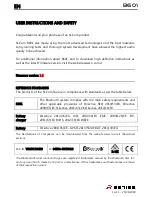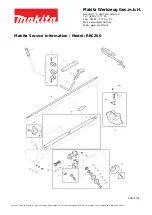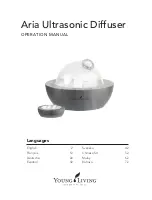
Purging the Heating Loop
Purging the Heating Loop
©Aqua-Hot®
125DN Installation Manual
REV 220419
©Aqua-Hot®
125DN Installation Manual
REV 220419
p. 49
p. 48
Failure Symptom
Possible Cause
Remedy
Burner switches off auto-
matically (fault lockout)
No combustion after start or automatic
repeat start
Flame extinguishes during operation
Burner overheats
Switch off burner and switch back on.
• Check coolant lines for obstructions, closed valves, and kinks.
• Check coolant level, purge any air. Allow burner to cool down.
Check for failure codes.
•
Charge/replace batteries.
• Switch off burner and switch back on.
Heater is letting out black
smoke from the exhaust
Combustion air and/or exhaust tube is
blocked
Check combustion air intake and or/ exhaust tube.
General Failure Symptoms of the Burner
This section will cover the typical failures of the diesel burner. Refer to the table more fails and their remedies.
Burner Troubleshooting
Burner does not switch on
Heater is without electrical power
Check power supply to the unit and ground connections.
Burner switches off during
operation (= fault lock-out)
Burner has overheated due to lack of
coolant
Refill antifreeze and water mixture.
Service of the Burner
The service or maintenance should be done once a year to
maintain the functional reliability of the burner. The service and
any repairs must only be performed by trained technicians.
Proper preventive maintenance greatly improves the burner
performance.
• Visual inspection of the burner for any external damage,
fastening, and also external cleaning (make sure power
is disconnected before any cleaning).
• Inspect electrical connections for corrosion, making
sure they are all properly secured and free of any kinks,
cracks, or damage.
• Check the exhaust and combustion air lines for signs of
damage and make sure they are clear of debris or any
blockages.
• Check fuel lines for any leaks, kinks, cracks, or damage.
• Check plumbing lines and circulation pump to make
sure they are properly secured and free of any damage.
• Check the fuel pump and circulation pump for any
damage.
• Run the burner for 20 minutes once a month.
• Clean the burner of any debris or dust with compressed
air.
•
Change the fuel filter once a year.
Figure 102
System Checks
Please do the following checks prior to the first operation to
confirm the installation was done properly and safely.
1.
Confirm that the Aqua-Hot 125DN is fully and properly
installed. It must be adequately filled of fluid and purged
of any excess air.
2.
Confirm the burner is properly and securely mounted, all
bracket fasteners are tightened.
3.
Confirm that there is ample space between the burner and
any heat-generating parts such as the exhaust.
4.
Confirm that there is ample space between the burner and
any moving vehicle parts during all system operations.
5. Make sure the burner is installed in location that is free
from any splashing water or debris, and protected from
other components installed in the same compartment.
6. There should be substantial separation from the burner
and the ground.
7. There should be enough space between the vehicle body
and any heat-generating components like the exhaust and
burner.
8. Ensure there is protection on any sharp edges or objects.
9.
Confirm that all of the plumbing and fuel lines are free from
any kinks or sharp bends, and are not pinched or could be
potentially cut.
10. Make sure all the hose clamps are properly positioned and
secured.
11.
Ensure that there is an adequate amount of fluid in the
system, and it has been purged of any air.
12. Make sure there is more than a ¼ tank of fuel and the
operating voltage to greater than 11.5V.
13.
Confirm that the plumbing lines leading from the burner to
the 125DN are below the expansion bottle.
14. Ensure that all wiring is properly secured and away from
any moving parts or heat sources.
15. Make sure the power and ground connections are properly
secured and installed.
Never operate the burner in closed rooms such as garages
or workshops that do not have proper ventilation. Please
be sure to confirm all the system checks prior to the first
operation.
16. Check all plumbing connections for leaks.
17.
Check that the fuses are in their proper, specified locations.
18. Make sure the fuse boxes are secure and protected from
any water sources.
19. Ensure the vehicle battery is mounted properly and all
connections are secure, and has a full charge.
20. Make sure the fuel standpipe is properly and securely
mounted in the fuel tank.
21. The standpipe should not interfere with the vehicle fuel
delivery system. Check the fuel gauge for proper operation.
22.
Confirm all fuel lines are secured and spaced safely away
from exhaust or other heat-generating components.
23. Make sure the fuel pump is installed in a cool place. It is
recommended to install the fuel pump in the same location
as the vehicle fuel tank.
24. Make sure the exhaust and clamps are properly secured.
25. The exhaust tube should be a safe distance from any
flammable materials (at least 2in).
26.
Confirm there are holes drilled in any low points in the
exhaust tube.
27. Exhaust opening should be a safe distance away from any
vehicle interior openings and should be directed to not
cause back pressure while driving.
28. The combustion air intake should get fresh air away from
the direction of travel.
29. Ensure the air intake system is properly secured.
30. All plumbing and fuel lines should be purged of any air, as
any air can cause a lock-out.
Once the system checks are complete and it has been confirmed
that all is properly and safely installed, please continue to the
first operation.
NOTE:
The burner must not be started until it has been
properly checked by a professional technician. The burner
must be installed professionally in accordance to the
installation instructions.
System Checks
Please do the following checks prior to the first operation to
confirm the installation was done properly and safely.
•
Make sure the fluid temperature is below 122°F.
• Check all connections for leaks.
• CO
2
settings should be set to factory settings.
• Refer to the troubleshooting procedure if the heater
switches to fault lock-out condition.










































